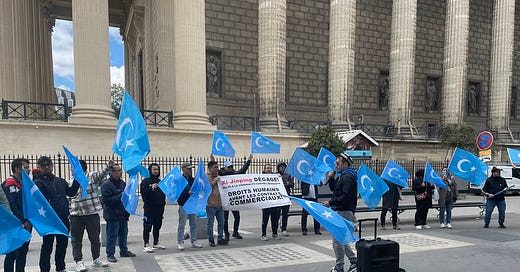Western multinationals tainted by forced Uyghur labour in China
Chinese ‘economic miracle’ built on atrocities
Uyghur activists in Paris protest against the state visit of Chinese President Xi Jinping to France May 6, 2024.
Photo: David Whitehouse.
There’s a fascination in some developing countries that China’s economic growth over recent decades provides a model which others might follow.
The idea of a proven non-Western, non-free market, model is of course tempting, both to many in the Global South, and to those on the left in the West.
The debatable notion that hundreds of millions of Chinese have been able to move from rural poverty to become “middle class” is also hard for some to shake off.
Whatever the overall merits of China’s state-driven economic planning, an uncomfortable truth is that forced labour of ethnic minorities is one of the ingredients of growth.
There are two systems of forced labour operating in China’s northwestern Xinjiang Uyghur Autonomous Region, according to Adrian Zenz, senior fellow and director in China Studies at the Victims of Communism Memorial Foundation in Washington.
The region, which has a population of about 26 million, was annexed by China in 1949.
The system of forced internments is no longer actively processing victims, Zenz told a Webinar on June 6. But forced transfers into agricultural labour are accelerating, he said. The Chinese state pressures Uyghur and other ethnic minority peasants to surrender their land to large agribusiness operators, then coerces them into wage labour, often for the same firms, he said.
Recent years have seen a “normalization and institutionalization of forced labour transfers,” Zenz said. The result is that “China uses the largest system of forced labour in the world.”
Western companies are among the beneficiaries. The supply chains of Kraft Heinz, Nestlé, Del Monte, PepsiCo, McCormick, Unilever and L’Oreal are all connected with the products of the forced labour, which include tomatoes, peppers, marigolds and the sugar-substitute stevia, Zenz said.
In Xinjiang, which has a majority Muslim population, up to 2.5 million Uyghurs and members of other ethnic groups are at risk of coerced work, according to open-access research from Zenz published in 2024.[1] Agribusinesses are being used to penetrate Uyghur communities, enforce state policies, spy on households, and identify persons for re-education or internment, the research says.
The US in 2021 determined that China’s atrocities against the Uyghurs amount to genocide, and France’s national assembly passed a resolution to the same effect in 2022.
In the UK, however, the Labour government has ducked the problem that the Conservatives before them were unwilling to tackle. UK foreign secretary David Lammy, while in opposition in 2023, said that Labour would pursue legal routes to declare that China is committing genocide against the Uyghurs[2], but once in office he dropped the idea.[3]
The European Union has slowly addressed the issue and will implement a new regulation in 2027 prohibiting goods made using forced labour. Canada and the UK lack such legislation, which is an obvious loophole.
In the US, the Uyghur Forced Labor Prevention Act creates a “rebuttable presumption” that goods made in Xinjiang or by entities with ties to the region are made with forced labour and are therefore banned from entering the US.
Zenz noted that the US act is often circumvented and better enforcement is needed. Until the US presumption is followed more widely by Western governments and addressed in corporate supply chains, the forced labour will continue.
[1] <span>Forced Labor, Coercive Land-Use Transfers, and Forced Assimilation in Xinjiang’s Agricultural Production</span> by Adrian Zenz, I-Lin Lin :: SSRN
[2] UK Labour aims to declare China’s treatment of Uyghurs ‘genocide’ – POLITICO
[3] Labour backtracks on push for genocide ruling on China’s treatment of Uyghurs | Uyghurs | The Guardian





The headline says it all. Western multinationals tainted by forced Uyghur labour in China.